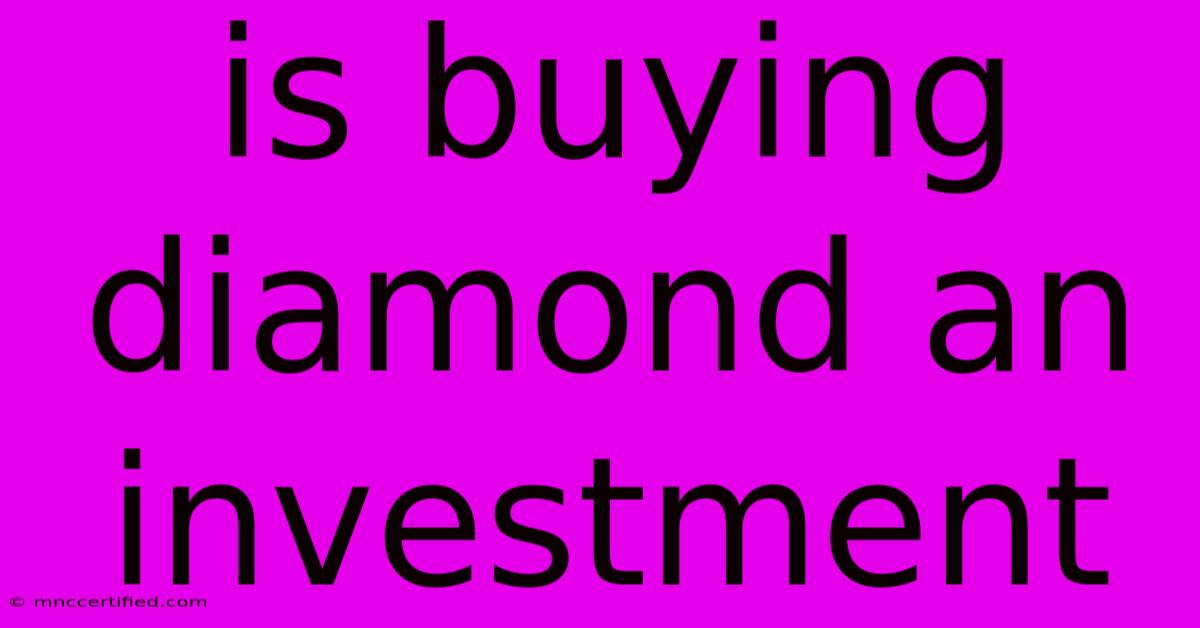Is Buying Diamond An Investment

Table of Contents
Is Buying a Diamond a Good Investment? A Comprehensive Guide
Diamonds. They're synonymous with luxury, romance, and… investment? While the idea of a sparkling stone appreciating in value like a fine wine or classic car is alluring, the reality of whether buying a diamond is a good investment is more nuanced. This comprehensive guide delves into the complexities, helping you determine if diamonds truly fit your investment portfolio.
The Allure of Diamonds as an Investment
The enduring appeal of diamonds stems from their perceived rarity, beauty, and historical significance. Many believe that, much like gold or real estate, diamond prices will consistently rise, offering a safe haven for their capital. This belief, however, requires a closer examination.
Factors Affecting Diamond Value: More Than Just Carats
Unlike traditional investments with established market mechanisms, diamond valuation is less straightforward. Several factors significantly influence a diamond's price, making it difficult to predict long-term appreciation:
- The 4Cs: Cut, clarity, color, and carat weight are the cornerstone of diamond grading. Higher grades command higher prices, but even within these grades, subtle variations exist. A perfectly cut diamond will fetch more than a poorly cut one, even if they have the same carat weight and clarity.
- Demand and Supply: Global economic conditions, consumer preferences, and production levels affect demand and, consequently, prices. Market fluctuations can impact your investment's worth significantly.
- Certification and Provenance: Reputable certification from organizations like the Gemological Institute of America (GIA) adds to a diamond's value and authenticity, increasing its resale potential. Knowing the diamond's origin and history also enhances its value.
- Market Liquidity: Unlike stocks or bonds, selling diamonds can be challenging. Finding a buyer willing to pay a fair price requires navigating specialized channels, potentially leading to lower resale value than the initial purchase price.
The Case Against Diamonds as an Investment
While the romantic notion of diamonds as an investment is enticing, the practical reality often falls short. Several critical points argue against viewing diamonds as a robust investment:
High Transaction Costs
Buying and selling diamonds involve substantial transaction fees. These include the retailer's markup, certification costs, and potential broker fees during resale, which can significantly reduce your potential profit.
Illiquidity and Difficulty in Reselling
Selling a diamond isn't as simple as selling a stock. You'll likely encounter difficulty finding a buyer who offers a fair price, potentially resulting in a significant loss compared to your initial investment.
Price Volatility and Lack of Transparency
Diamond prices aren't consistently upward trending. Market fluctuations, economic downturns, and shifting consumer preferences can all contribute to price drops, eroding your investment's value. Moreover, the lack of a centralized, transparent market makes accurately assessing current prices difficult.
Potential for Fraud and Misrepresentation
The diamond industry isn't entirely immune to fraud and unethical practices. Without thorough knowledge and trusted sources, you risk purchasing a diamond with misrepresented qualities, leading to significant financial losses.
Diamonds: A Luxury Purchase, Not Necessarily an Investment
Ultimately, buying a diamond is more of a luxury purchase than a sound investment. While certain high-quality, rare diamonds might appreciate in value, the associated risks, costs, and illiquidity make it a risky venture compared to more established investment options.
Alternatives to Diamond Investments
If your goal is investment growth, consider diversifying your portfolio with options that offer greater liquidity, transparency, and potential returns:
- Stocks and Bonds: Traditional investments offer greater liquidity and regulated markets.
- Real Estate: Real estate can provide rental income and potential appreciation over the long term.
- Precious Metals: Gold, silver, and platinum offer relative stability and are easier to sell than diamonds.
- Exchange-Traded Funds (ETFs): ETFs provide diversified exposure to various asset classes with ease of buying and selling.
Conclusion:
While the beauty and symbolism of diamonds are undeniable, relying on them as a primary investment vehicle is ill-advised. Before purchasing a diamond, carefully weigh the associated risks and costs against the potential for appreciation. For sound investment strategies, explore more liquid and transparent options. Ultimately, a diamond should be seen as a luxury purchase driven by personal preference, not an expectation of significant financial returns.

Thank you for visiting our website wich cover about Is Buying Diamond An Investment. We hope the information provided has been useful to you. Feel free to contact us if you have any questions or need further assistance. See you next time and dont miss to bookmark.
Featured Posts
-
Investment Banks In Connecticut
Nov 26, 2024
-
Volkswagen Jetta Insurance Cost
Nov 26, 2024
-
Shelter Insurance Manchester Tn
Nov 26, 2024
-
Bottom Up Investing Vs Top Down
Nov 26, 2024
-
Motorcycle Insurance For Mexico
Nov 26, 2024